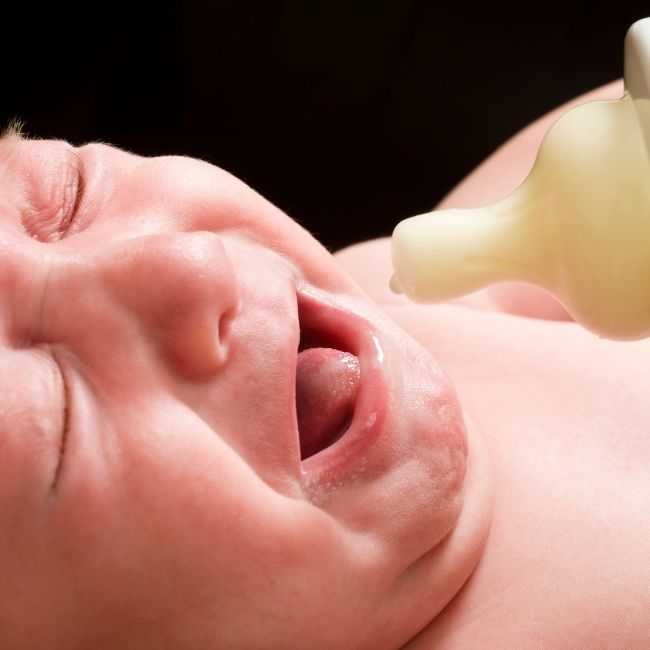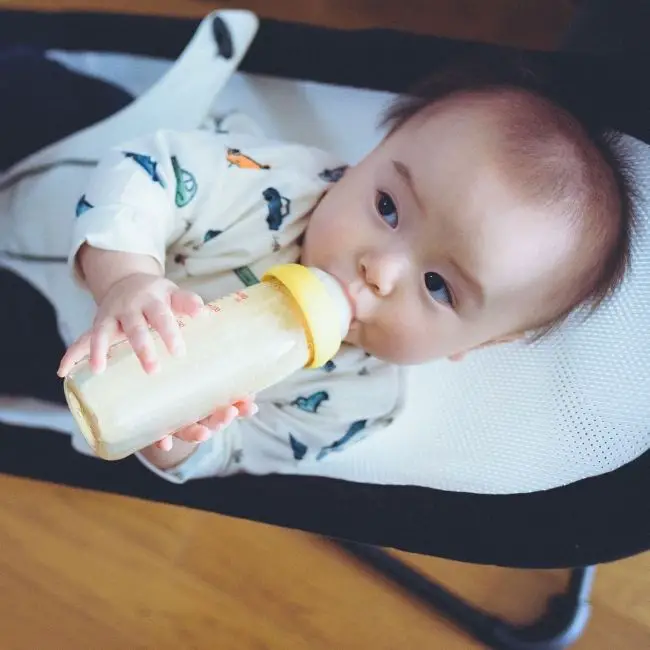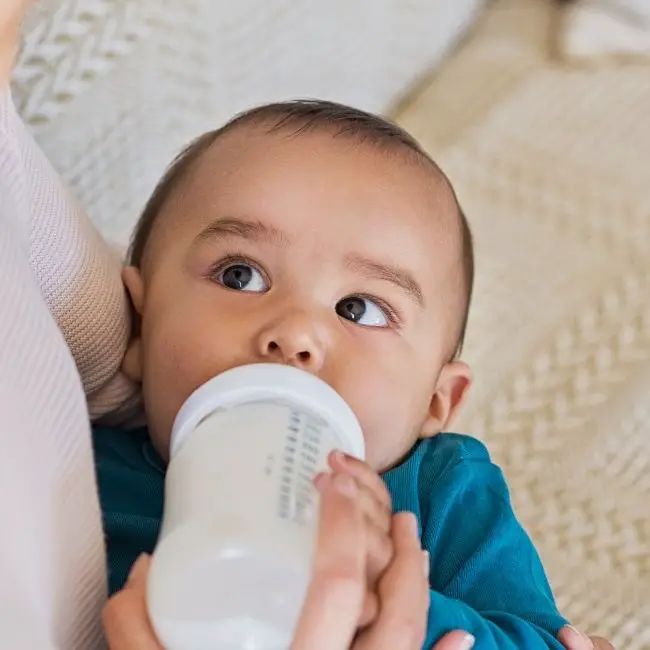Does your baby seem abnormally fussy during bottle feeding times? Oddly enough, it isn’t all that uncommon. There are many reasons why you may find baby fussy during feeding bottle, and thankfully, many of them are quick and easy to fix. So, let’s explore some ways you can handle a fussy baby so that you, and your baby, can experience more peace at mealtimes.
Baby Fussy During Feeding Bottle
Why is my baby uncomfortable during feeding?
If you find that your baby squirms and cries while bottle feeding, there is likely something wrong. In most instances, what is wrong isn’t serious, but it will be something that you’ll want to correct to ensure that mealtimes flow smoothly.

Why is my baby fighting the bottle?
Does your baby squirm while bottle feeding and cries? Check out the following scenarios and reasons your baby may be showing signs of discomfort.
And, as always, book an appointment with your local pediatrician for tailored advice on how best to assist your little one.
Baby Fights Bottle But Hungry
If you know for certain that your little one is hungry but he or she is still fighting his or her bottle, you may want to phone your doctor. You want to rule out illness or other impending reasons your little one isn’t taking their bottle because if he or she is truly hungry, then they are also missing out on the nutrition of a good meal.
Still, there could be other reasons your baby is fighting the bottle though he or she is hungry. Check the flow of the nipple and ensure you’ve purchased the right flow for your baby’s age. In addition, you’ll want to check that the milk you are giving your baby is the right temperature. And also, that your baby isn’t physically uncomfortable (i.e. he or she is being held in an odd way).
Baby Cries Halfway Through Bottle
On the other hand, if your baby is taking his or her bottle, but seems to experience discomfort halfway through, it could be that your baby has gotten full, is experiencing a tummy ache or, similarly, that he or she is experiencing infant gas.
Watch closely for signs that your baby has gotten full and take note of how much your baby has consumed before showing signs of discomfort. In addition, be sure to avoid shaking the bottle as much as is possible before giving the bottle to the baby to prevent air bubbles from forming in the milk which can cause gas.
Lastly, be sure that it isn’t the milk itself that is giving your baby issues. Some formulas agree with babies, and others not so much. Talk to your pediatrician about your options before switching abruptly to another formula if you suspect your baby has a sensitivity to the formula you are offering.
Baby Kicking Legs While Bottle Feeding
A baby kicking his or her legs during bottle feeding could have a variety of meanings. It could be that your little one is excited to see the bottle and to be cuddled up with you, but it could also have negative connotations.
If you find that your baby is pulling their legs up close to their body then this could be an indicator of gas. Ths gassy feeling is painful in the baby’s stomach.
Conversely, rapid kicking of the legs can sometimes mean that your baby is overtired or over-stimulated. This is especially true if you are feeding them close to bedtime. In this case, the rapid kicking may be accompanied by a “wild-eyed” look and frequent unlatching.

Baby Gulping Bottle and Crying
If it appears that your baby is rapidly gulping down the bottle you provide him or her and don’t seem to be enjoying it, it could be that the nipple flow is too fast.
When purchasing a nipple for your baby, look closely at the packaging and age recommendation for the intended flow. In most cases, very young babies will need a slow flow nipple. If the nipple you’ve affixed to the bottle flows too fast, the baby won’t be able to keep up and the bottle feeding time will not be enjoyable. This may also cause baby to gasp and choke.
Baby Fussing at Bottle
If you find that as soon as you present the bottle to your baby your baby crying when feeding bottle and/or turns away, it could be that your baby simply isn’t hungry.
Of course, there are times when your baby will need to eat, but the timing of feedings can vary wildly between infants.
Rather than force your baby to eat, wait 30 minutes to an hour and try again. If your baby seems to readily take the bottle at a later time, then you may need to space feedings further apart.
Whatever you do, never force your baby to take the bottle if he or she isn’t hungry, as this can train the baby to take in more calories than they need and will make feeding an overall bad experience.
Speak to your pediatrician before making drastic changes to your baby’s feeding schedule.
Baby Crying During Feeding
As previously mentioned, if your baby cries during bottle feeding it can be linked to having gas, sensitivity to formula and even a lack of appetite. If your baby continues on crying during a feed, you may consider keeping a journal of the time you are feeding the baby, the type of formula and your baby’s response and reporting your findings to your local healthcare provider.
Baby Refuses Bottle and Cries
If you see that your baby cries during feeding and also outright refuses it, it is definitely time to talk to a pediatrician. It is important that your baby receives a healthy meal and all the nutrients that encompass it. In the meantime, check your baby’s formula and switch the formula once or twice to see if that helps.
Ask your doctor about the possibility of lactose intolerance, especially if the milk you are giving isn’t breastmilk. Once you’ve nailed down the root cause of your baby’s refusal of the bottle, you should have an easier go at giving your baby his or her bottle.
Baby Cries After Feeding Formula
A lot of times, baby formula can be upsetting to baby’s sensitive stomachs. It is this reason, along with countless others, that breastmilk is often recommended for babies rather than cow’s milk or formula.
If your baby cries after feeding formula, it may be wise to keep your baby on breast milk if you are able.
If you are unable, speak with your local pediatrician about other options for formula for your baby. No matter what you choose, do not switch your baby over to dairy-free fortified milks intended for children and adults. You will need to find a proper baby formula, with the help of your pediatrician, to ensure your baby gets the right nutrients if giving your baby breastmilk isn’t an option.

How do you know formula doesn’t agree with baby?
Sometimes, baby formula simply doesn’t agree with your baby. It could be the milk within the formula or it could be that you need to switch formula brands. Either way, it can help to know the signs that your baby isn’t tolerating his or her formula well.
Some signs that formula doesn’t agree with your baby include:
- Diarrhea or Watery Stools
- Gas
- Pulling Legs Up to Chest and Crying After (or During) a Feeding
- Excessive Crying After or During a Feeding
- Forceful Vomiting
- Persistent Skin Issues
Note that the above signs aren’t exclusively linked to low tolerance for baby formula. However, if you notice any or all of the above symptoms on a regular basis and they seem to coincide with feedings, you will want to schedule an appointment with your pediatrician immediately to get to the bottom of what might be causing your baby discomfort.
Baby Fighting Bottle at 3 Months
Why is my baby fighting the bottle at 3 mos?
At three months of age, you may notice that your baby is fighting his or her bottle. This could be due to a multitude of factors.
It is important to keep in mind that a few babies may begin sprouting teeth at this age. The pain of incoming teeth can sometimes disrupt the feeding process. So if you notice your baby fighting the bottle sporadically during the day, this could be the issue.
Another aspect to consider if you find that your baby is fighting the bottle at 3 months is whether or not your baby is new to the bottle. If you have been breastfeeding your baby up until now and are trying to introduce a bottle to him or her, it is likely that your baby will reject the bottle. Talk to your pediatrician about ways to help alleviate this issue.
Lastly, if you find that your 3 month old is fighting his or her bottle, be sure to review some of the reasons previously mentioned in this article to get down to the root of what’s going on. Sometimes, your baby simply might not be hungry, and other times, your baby may not agree with the formula.
There are many reasons why your 3 month old could be fighting their bottle. Speak with a professional for tailored advice on what’s best to do.
Baby Fussing at Breast Milk
Baby Fussy During Feeding Bottle Breast Milk
Why is my baby fussing at bottled breast milk?
If you notice that your baby is fussy with bottled breast milk as opposed to formula, it could be that your baby isn’t hungry, is overtired or that the flow of the nipple is too fast.
You should also ensure that if the milk was stored ahead of time that the milk isn’t spoiled and isn’t too hot or too cold. Otherwise, you’ll want to make sure the baby is comfortable, and as always, simply try again at a later time.
What do I do when my baby cries while feeding?
If your baby is crying while feeding, you should go ahead and stop the feeding. No matter what the issue is, you should never continue to force your baby to eat if he or she doesn’t want to.
Next, assess the situation. Is your baby comfortably positioned in your arms? Is he or she truly hungry or could they still be satiated from the last meal?
If push comes to shove, simply stop feeding your baby, reassess the situation and try again at a later time.
How do you feed a fussy baby with a bottle?
- Stop feeding your baby once you notice he or she is crying or upset.
- Ensure that the milk isn’t too hot or too cold.
- Readjust your baby to ensure his or her comfort before trying again.
- Check your baby’s diaper and address any other needs that your baby may have unrelated to hunger (the baby may be cold, hot, sick, etc).
- If all else fails, wait another 30 minutes to an hour before trying to feed your baby again.
- Speak with your pediatrician if the problem persists to rule out illness or intolerances.

Tips For Proper Bottle Feeding
- Always ensure the temperature of your baby’s bottled milk isn’t too hot or cold and hovers around 98.6 F.
- Never prop your baby’s bottle up. You should hold your baby’s bottle to ensure a good angle.
- Always position your baby at an angle during feedings, instead of laying them flat.
- Refrain from twisting the ring around the neck of the bottle too tight.
- Never continue to feed a baby who is resisting feedings.
- Never keep the bottle in the baby’s mouth if he or she isn’t actively sucking.
- Schedule a consultation with your pediatrician if your baby seems hungry but isn’t taking his or her bottle to rule out illness.
What to Do If Baby Is Fussy During Feeding Bottle
All in all, if you find your baby to be fussy during feeding bottle, your best course of action is always to stop and assess the situation. In addition, you’ll want to get in contact with your local healthcare provider to rule out illnesses, especially if your child seems hungry but still won’t eat. We hope this has helped you solve the problem of your baby fussing during bottle feedings!
Baby fussing during the evening? Click through to read our blog on the topic!
Lynn
Lynn is a freelance writer, a wife, and a mother of two beautiful kids. Lynn started Infant Empire with the aim of making parenting easier for fellow mums and dads. She believes the parenting tips provided here will be of great help to all parents.Recommended Reading
7 Best Bottle Warmer For Comotomo Bottles Reviewed
If you are wondering which warmer is best for this bottles, below is a comprehensive guide of the best bottle warmer for Comotomo bottles.
Do I Need A Nursing Pillow To Ease Breastfeeding? (2022)
Do I need a nursing pillow to make breastfeeding easier? Absolutely yes, it is a life saver. It helps to ease breastfeeding and get a good latch...
Orange Juice For Baby Constipation
We’ve set out to answer this question and more in today’s post about whether or not orange juice should be used to treat baby constipation.
Is A Bottle Warmer Necessary?
Is a bottle warmer necessary? Yes. You definitely need one for several reasons such as it is convenient, heats consistently and at right temperature...
Soy Milk For Toddlers: Pros and Cons of Giving Toddlers Soy Milk Products
Is it okay for children to drink soy milk? Yes and no. Join us as we tackle tricky questions about the consumption of soy for toddlers.
Mixing Formula With Breast Milk – Is It Safe?
Is it a good idea? With so much info out there about what to do and what not to do, it can be difficult to tell what's right.
